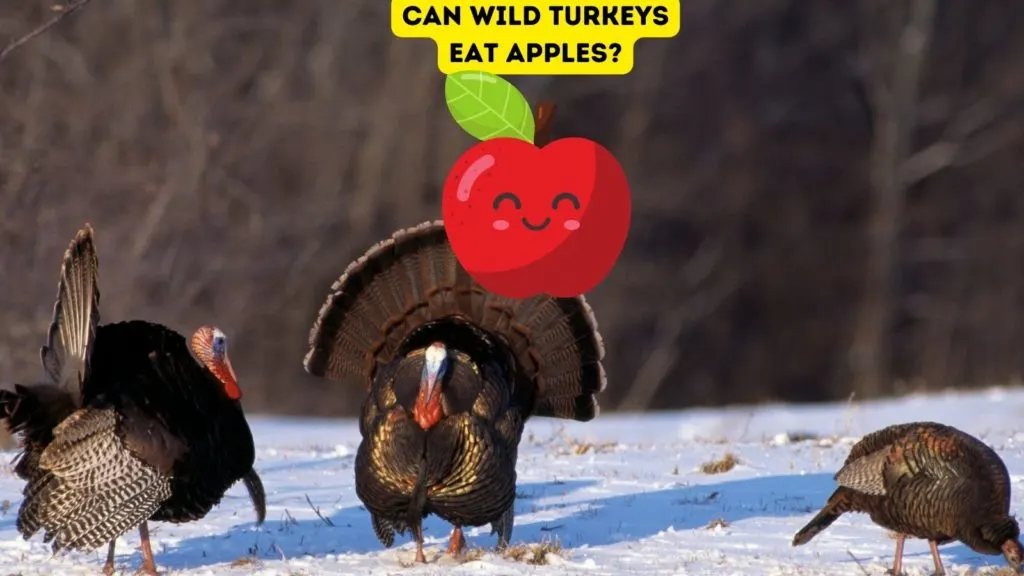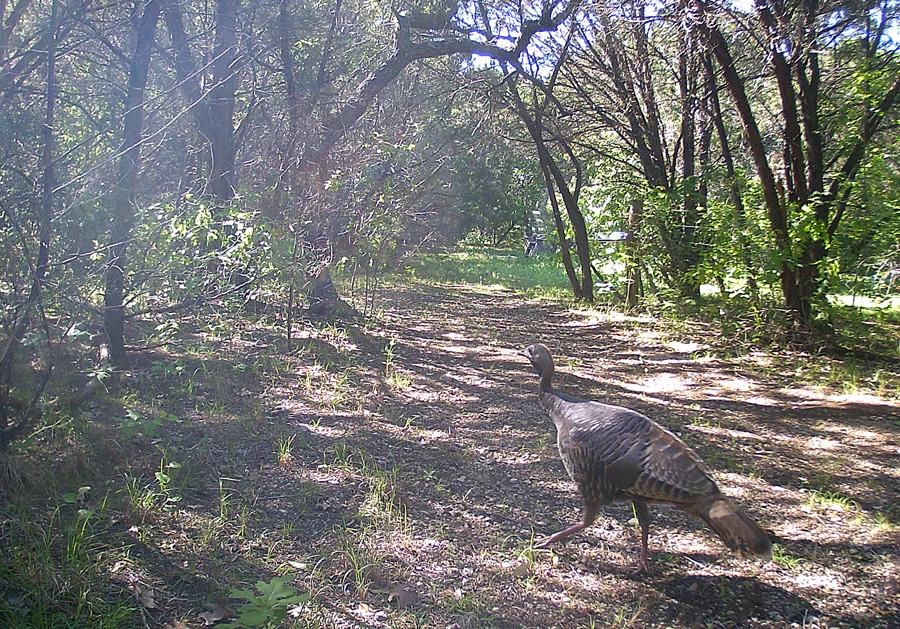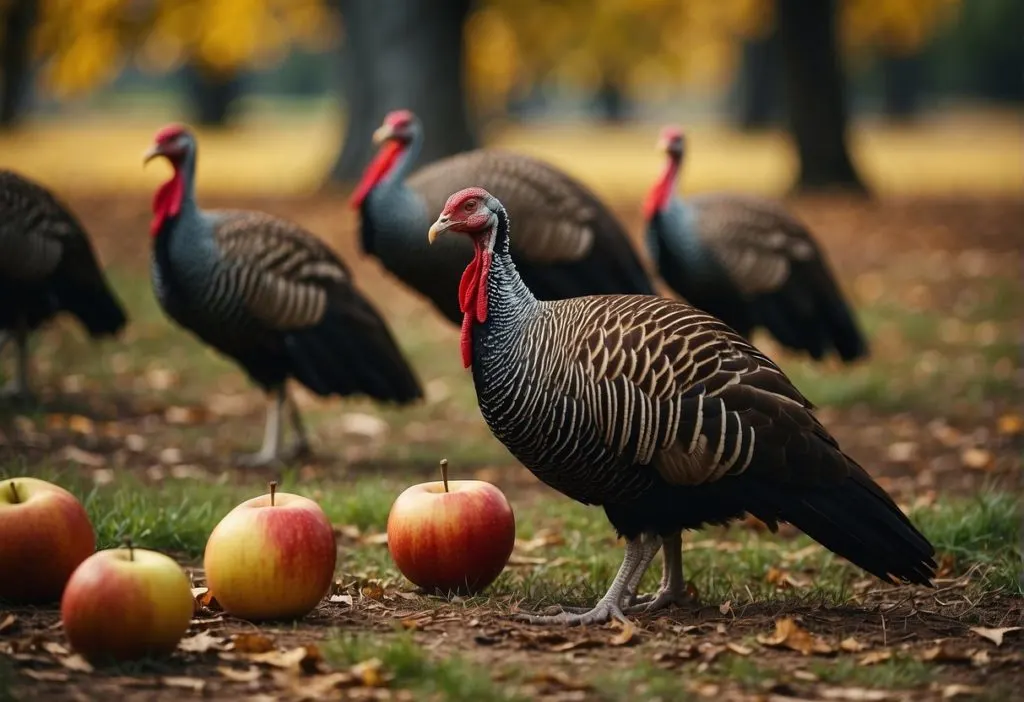Wild turkeys forage naturally for a variety of foods to fulfill their dietary needs. If you’re curious about these wild birds and their eating habits, you might wonder whether apples are a suitable addition to their natural buffet. In fact, turkeys are omnivores and their diet includes a broad range of items, from seeds and berries to insects and small reptiles, but how do apples fit into this diet?

Should Wild Turkeys Eat Apples?
Apples are safe for wild turkeys and can actually be a nutritious snack for them. These fruits are a source of vitamins and fiber, which can be beneficial to turkeys as part of a balanced diet.
As autumn brings a bounty of fallen fruit, you may even observe a group of wild turkeys pecking away at apple remnants in orchards or forests, supplementing their diet with the sweet treat.
At our house, it’s pears! They love foraging beneath the pear trees for fallen fruit.
However, it’s important to note that, like many animals, turkeys should eat such sugary foods in moderation.

Potential Risks and Benefits of Apples
Benefits of Apples:
- Nutritional Value: Apples are a source of Vitamin C and antioxidants, which are beneficial for turkeys’ immune health.
- Dietary Fiber: The skin of the apple contains dietary fiber that aids in digestion for turkeys.
Potential Risks:
- Sugar Content: Apples do have sugar, which should only be fed in moderation to avoid health issues.
- Toxic Seeds: Apple seeds contain a compound that can release cyanide when digested, which is toxic to turkeys.
Best Way to Serve Apples
To safely serve apples to turkeys, follow these guidelines:
- Remove the seeds: Ensure that all apple seeds are removed to prevent toxicity.
- Chop into chunks: Slice the apple into small, manageable pieces to make it easier for turkeys to eat.
- Moderation: Feed apples as a treat alongside their regular diet.
Role of Fruits and Berries
- Diversified Diet: Including fruits and berries in a turkey’s diet can diversify their nutrient intake.
- Natural Forage: In the wild, turkeys naturally consume a variety of fruits and berries, which are part of their balanced diet.
Remember to always provide a mixture of foods to ensure turkeys get all the nutrients they require.
Wild Turkey Dietary Habits

When you observe wild turkeys, you’ll notice their diverse diet changes with the seasons and available food sources. They adapt their feeding behavior to ensure they’re getting the nutrients they need throughout the year.
Seasonal Feeding Patterns
Spring and Summer:
During these warmer months, wild turkeys tend to feast on a variety of seeds, nuts, and fruits. You’ll find them munching on:
- Buds and leaves
- Tubers and bulbs
- Berries and wild grapes
Fall and Winter:
As the temperature drops and some foods become scarce, turkeys shift their focus to:
- Acorns and hickory nuts
- Leftover grains from farming activity
- Crabapples and other persistent fruits
Foraging Behavior
Wild turkeys are active foragers, using their keen sense of sight to find food on the ground or in low-lying shrubs. Their typical foraging behavior includes:
- Scratching and pecking at the ground
- Feeding in flocks, which is a communal activity
They consume a blend of plant-based items and animal-based proteins such as insects like grasshoppers and beetles. They’re especially fond of food sources that provide them with a rich amount of protein and are known to adjust their foraging intensity according to food availability and their own energy needs.
Feeding Practices for Wild Turkeys
When caring for wild turkeys, ensuring a balanced diet that mimics their natural foraging is essential. Providing supplemental feeding may be necessary in some cases, but it’s important to do so with caution.
Supplemental Feeding Tips
When you’re considering supplemental feeding for wild turkeys, remember:
- Feeding in Moderation: Too much of a good thing can lead to health issues. Offer treats like apples sparingly to avoid disrupting their natural eating habits.
- Natural Foods: Stick to what turkeys find in the wild whenever possible, such as corn and acorns.
- Grit for Digestion: Wild turkeys require grit to grind up their food. If you’re feeding turkeys, make sure they have access to small pebbles or a commercial grit.
| Treat | Frequency | Notes |
|---|---|---|
| Apples | Occasionally | Cut into small pieces |
| Corn | In small amounts | Can be a staple in their diet |
| Acorns | As available | Natural food source |
Maintaining a Natural Diet
To keep wild turkeys healthy and thriving:
- Encourage Natural Foraging: Allow turkeys to search for their own food to maintain their natural behaviors.
- Avoid Overfeeding: Consistently providing food can make turkeys reliant on you. Instead, let them find most of their nourishment from insects, seeds, and wild berries.
- Seasonal Variations: Understand that a turkey’s diet will change with the seasons, and adjust your feeding practices accordingly.
More Posts You Might Like
- Does Bird Seed Expire? - May 11, 2024
- How Big Are Baby Hummingbirds? - May 5, 2024
- How to Prevent Mold in Hummingbird Feeder - May 2, 2024
